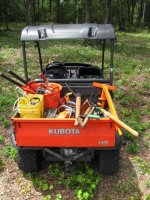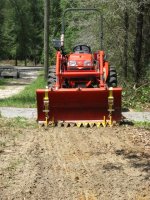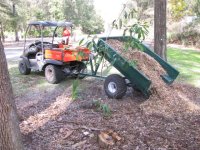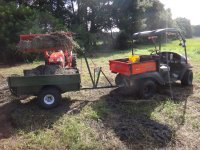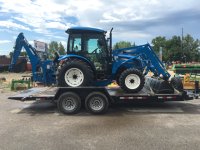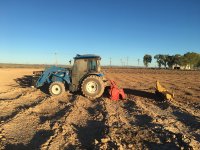TennesseeBill
New member
Hello, I am looking to buy a tractor but am fairly clueless the choices and additions are endless. The last time I was on a tractor was when I was a teenager working on various farms in Indiana. Beyond the tidbit this is our requirement situation:
We are buying between 132 and 150 acres in Eastern Tennessee near Treadwell, about 5 miles South of Sneedville in Hancock county. There are 40 ish acres in pasture now that is being hayed by someone else. I plan on converting another 10 15 acres that is open into pasture. The rest is wooded.
Since there have not been any livestock on the land in at least 4 5 years I would like to raise grass fed cattle and plan to do rotational grazing. I plan to cross fence the pasture land when I am not building the house.
We are planning to have the normal chickens, with a couple of goats. We hope to eventually have 2 horses.
In addition, I plan on having an organic garden, initially just for us.
It will be primarily me on the tractor.
Things I think I will need:
1. Obviously, I need a FEL (seems there are many options here also)
2. Since we will still be haying I need a way to get the bales up to the barn (Bale spear?).
3. I think I may need an excavator although maybe these can be rented. There are 5 or 6 stream that flow on the property, which I need to get into shape and maintain. In addition, I have seen a couple of springs and these need to be worked also. I also want to bury my electric line.
4. There are areas that need to be brush hogged, although I am not sure if this requires a purchase or rental.
5. I will need to haul items across the farm, thus the FEL.
6. Would there be a need for towing a wagon of some sort on or off the farm.
7. Blade for maintaining the gravel drive way (about .4 of a mile), maybe some snow removal once or twice a year?
Beyond that I am not sure what I will be needing as far as implements and certainly am unsure of which brand and size of tractor is best suited for our situation, although I was thinking a mid size 50- 60 HP?
It seems like a lot of people believe JD and Kubota are the best, although the most costly, from what I have been reading.
I keep reading the advice that you should go and test drive. Do all dealers have models you can test out and in the field, how does that work?
I have no favorite but just want something that will last (outlast) me.
I guess these are really basic dumb questions but I need to start somewhere.
FYI, if it adds anything, I normally keep my cars 15 20 years.
Money is not the primary driver here. I will sacrifice elsewhere is need be.
So any help would be appreciated.
We are buying between 132 and 150 acres in Eastern Tennessee near Treadwell, about 5 miles South of Sneedville in Hancock county. There are 40 ish acres in pasture now that is being hayed by someone else. I plan on converting another 10 15 acres that is open into pasture. The rest is wooded.
Since there have not been any livestock on the land in at least 4 5 years I would like to raise grass fed cattle and plan to do rotational grazing. I plan to cross fence the pasture land when I am not building the house.
We are planning to have the normal chickens, with a couple of goats. We hope to eventually have 2 horses.
In addition, I plan on having an organic garden, initially just for us.
It will be primarily me on the tractor.
Things I think I will need:
1. Obviously, I need a FEL (seems there are many options here also)
2. Since we will still be haying I need a way to get the bales up to the barn (Bale spear?).
3. I think I may need an excavator although maybe these can be rented. There are 5 or 6 stream that flow on the property, which I need to get into shape and maintain. In addition, I have seen a couple of springs and these need to be worked also. I also want to bury my electric line.
4. There are areas that need to be brush hogged, although I am not sure if this requires a purchase or rental.
5. I will need to haul items across the farm, thus the FEL.
6. Would there be a need for towing a wagon of some sort on or off the farm.
7. Blade for maintaining the gravel drive way (about .4 of a mile), maybe some snow removal once or twice a year?
Beyond that I am not sure what I will be needing as far as implements and certainly am unsure of which brand and size of tractor is best suited for our situation, although I was thinking a mid size 50- 60 HP?
It seems like a lot of people believe JD and Kubota are the best, although the most costly, from what I have been reading.
I keep reading the advice that you should go and test drive. Do all dealers have models you can test out and in the field, how does that work?
I have no favorite but just want something that will last (outlast) me.
I guess these are really basic dumb questions but I need to start somewhere.
FYI, if it adds anything, I normally keep my cars 15 20 years.
Money is not the primary driver here. I will sacrifice elsewhere is need be.
So any help would be appreciated.
